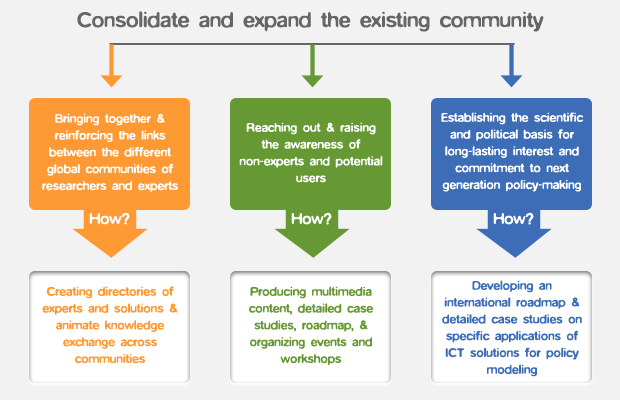The CROSSOVER project aims to consolidate and expand the existing community on ICT for Governance and Policy Modelling (built largely within FP7) by:

- Bringing together and reinforcing the links between the different global communities of researchers and experts: it will create directories of experts and solutions, and animate knowledge exchange across communities of practice both offline and online
- Reaching out and raising the awareness of non-experts and potential users, with special regard to high-level policy-makers and policy advisors: it will produce multimedia content, a practical handbook and high-level policy conferences with competition for prizes;
- Establishing the scientific and political basis for long-lasting interest and commitment to next generation policy-making, beyond the mere availability of FP7 funding: it will focus on use cases and a demand-driven approach, involving policy-makers and advisors in high-level conference, defining a collaborative stakeholders' declaration and developing a sustainability plan.
The CROSSOVER project pursues this goal through a combination of content production, ad hoc and well-designed online and offline animation; as well as strong links with existing communities outside the CROSSOVER project and outside the realm of e-Government.
The present deliverable, developed under WP2 Content Production, is one of the core outputs of the project: the International Research Roadmap on ICT Tools for Governance and Policy Modelling. It aims at providing a common basis and a common set of concepts for researchers in a highly multidisciplinary context. But most of all, it aims to provide a clear outline of what technologies are available now for policy-makers to improve their work, and what could become available tomorrow.
CROSSOVER builds on the results of the CROSSROAD project, which elaborated a research roadmap on the same topic along the whole of 2010. With respect to the previous roadmap, this document is firstly a revised and updated version. Beside this, it contains some fundamental novelties:
- A demand-driven approach: rather than focussing on the technology, the present roadmap starts from the needs and the activities of policy-making and then links the research challenges to them
- An additional emphasis on cases and applications: for each research challenge, we indicate relevant cases and practical solutions
- A clearer thematic focus on ICT for Governance and Policy-Modelling, by dropping more peripheral grand challenges of Government Service Utility and Scientific Base for ICT-enabled Governance.
- A global coverage: while CROSSROAD focussed on Europe, CROSSOVER includes cases and experiences from all.
What is Crossover about? - Crossover is about establishing the scientific and political basis for long-lasting interest and commitment to next generation policy-making
- Crossover is about bringing together and reinforcing the links between the different global communities of researchers and experts
- Crossover is about reaching out and raising the awareness of non-experts and potential users, with special regard to high-level policy-makers and policy advisors

How is Crossover going to achieve its goals? - By creating directories of experts and solutions, and animating knowledge exchange across communities of practice both offline and online.
- By producing multimedia content, detailed case studies, roadmap, workshops and high-level policy conference with competition for prize
- By providing a valuable knowledge base and eventually an ultimate ontology for policy modeling.
What is so innovative about Crossover?
Crossover offers a new innovative concept: an ICT–Enabled policy–making framework that takes full account of the complexity and dynamics of human and organizational behaviors.
This is fulfilled by taking into account three trends that have an important impact on todays and future’s policymaking.
Objectives
Today, in an increasingly interdependent, unstable and complex world:
- policy-makers continue not to be supported by tools to anticipate emerging problems and the impact of possible solutions,
- citizens are becoming more physically participant and vocal in monitoring and influencing policy decisions.
The new challenge is to offer possible solutions to the above points.
Opportunities
Emerge ICT tools for governance and policy modeling through the dramatic and combined growth of data availability, analysis and simulation tools, accounting for diversity of human behavior.
However, research and deployment are fragmented between academic fields, policy domains, geographical areas, technological layers and type of stakeholders.